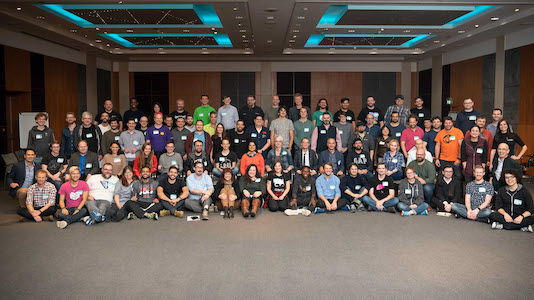Sustain Summit 2018
Posted on 22 January 2019
Sustain Summit 2018
 Image by sustainoss.org.
Image by sustainoss.org.By Raniere Silva, Community Officer, Software Sustainability Institute.
Sustainer is "the individual or organisation who is concerned with the fragile state and future of highly-used and impactful open source projects." A diverse and fantastic group of sustainers met in London at the end of October for a day discussion related to the sustainability of open source projects.
At the Software Sustainability Institute, "sustainability means that the software you use today will be available – and continue to be improved and supported – in the future." We don't discriminate about the number of users that a piece of software has or its impact factor. Part of the Institute's mission is to incorporate a basic introduction to software development as a core part of any researcher's training so that the software they use is available in the future. Because of that, I was inspired to attend Sustain Summit 2018.
During the Summit, we had plenty of group discussions around topics identified during the pre-event engagement. I have three highlights to share.
Governance Models
Any project is made possible through the efforts of members that perform numerous vital roles, from direct package development to communication, distribution, and managerial activities. Even open source being 20 years old in 2018, sustainers couldn't find a fit-all size solution for how to coordinate all the efforts from a project. The good news is that many projects, such as AstroPy, have found a model that works for them and they’ve shared said model.
Financial Sustainability Models
Someone needs to pay the electricity bill to keep the servers hosting the code of a running project. Who should pay the bill? How to pay for other things; for example, stickers? Financial models are another thing that, in the last 20 years, different projects are experimenting with – and some were very successful. For example, IBM acquired Red Hat for approximately US$34 billion. Moreover, if 10 years ago the most viable option was consultancy, today service is a very popular option, and what GitLab, NextCloud and others choose to use.
Maintainers Rehab
In 2018, we saw many people talking about the poor mental health of researchers and open source developers. Times Higher Education wrote that "the stressful postgraduate environment often leads not to solidarity but the impoverishment of research". Ways of taking care of ourselves and coping with burnout were shared during the discussions.
Final words
In addition to the topics I highlighted, we also mentioned licensing, community building and on-boarding new contributors, supporting equitable and diverse communities, sharing common resources (i.e., project manager, legal, etc), open source research, useful measures of success and impact (also known as metrics). It was a very productive meeting to generate ideas to try in 2019.
Some of the attendees recorded a few words in a video answering: how do you define sustainability, what's currently broken about open source development and what does a world with open source sustainability look like? See videos below.
How would you answer these questions?
